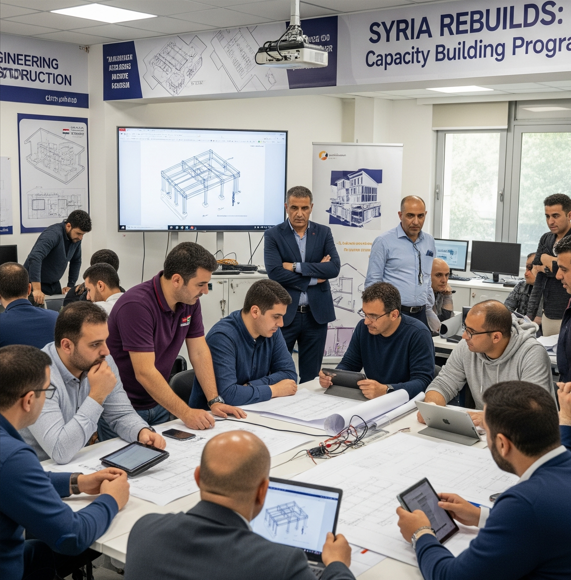Capacity building and training for engineers and technicians: a cornerstone of Syria's reconstruction and prosperous future.

The reconstruction of Syria is not merely a colossal urban project; it's a comprehensive journey toward restoring life, fostering stability, and building a prosperous future. At the heart of this journey lies the empowerment of local cadres of engineers and technicians, for they are the minds and hands that will transform visions into tangible reality. Investing in their capacity building and training is not just a strategic choice, but an imperative necessity to ensure that the reconstruction process is sustainable, effective, and truly Syrian-owned.
Why is Capacity Building Key?
Years of crisis have left a profound impact on all sectors in Syria, including the engineering and technical fields. Alongside the physical destruction, the country witnessed a brain drain, a halt in curriculum modernization, and a decline in practical training opportunities. This situation has created a gap in the skills and knowledge necessary to address the complex challenges of reconstruction.
This is where capacity building and training programs come in, aiming to:
- Bridge the Skills Gap: Equip engineers and technicians with modern knowledge and techniques they may have missed.
- Enhance Efficiency and Quality: Ensure that implemented projects meet the highest standards of quality, safety, and efficiency.
- Stimulate Innovation: Encourage creative and sustainable solutions that are appropriate for the Syrian context.
- Build Trust and Ownership: Empower local cadres to lead the reconstruction process, fostering their sense of responsibility and belonging to their country's future.
- Provide Sustainable Employment Opportunities: Create a thriving job market based on local expertise, which reduces unemployment and contributes to economic stability.
Training Programs: A Bridge to the Future
Many international and local organizations, especially UN agencies, have recognized the critical importance of these initiatives. These agencies have launched specialized and intensive training programs, specifically designed to meet the evolving needs of the reconstruction process. These programs are not limited to theoretical aspects; they heavily focus on practical application and field experience, ensuring participants are ready for immediate involvement in projects.
The training areas cover a wide range of vital specializations, including but not limited to:
- Advanced Construction Project Management: From planning and design to execution, monitoring, and evaluation, with an emphasis on risk and quality management.
- Sustainable and Environmentally Friendly Building Technologies: Using materials and techniques that reduce environmental impact and save energy, such as solar power and water recycling systems.
- Restoration and Rehabilitation of Heritage and Damaged Buildings: Preserving Syria's cultural and architectural identity while ensuring structural integrity.
- Development of Vital Infrastructure: Designing, implementing, and maintaining water and sanitation networks, energy systems, and modern communication networks.
- Urban Planning and Urban Reconstruction: Developing comprehensive plans for rebuilding damaged cities and areas in an organized and forward-looking manner.
- Occupational Health and Safety in Construction Sites: Implementing the highest safety standards to protect workers, engineers, and technicians.
- Use of Modern Engineering Software: Training on Computer-Aided Design (CAD) and Building Information Modeling (BIM) software, which has become essential for major projects.
- Communication and Leadership Skills: Enhancing the ability of engineers and technicians to work within multidisciplinary teams and lead projects effectively.
Far-Reaching Impact: Building Not Just Stones, But People
The positive impact of these programs goes beyond simply equipping individuals with skills. It contributes to:
- Enhancing Community Resilience: Building communities capable of recovering from crises and rebuilding themselves with greater strength.
- Achieving Sustainable Development: Ensuring that reconstruction efforts are part of a broader vision for long-term economic and social development.
- Building Institutional Capacity: Transferring knowledge and expertise to Syrian institutions, enhancing their ability to plan, execute, and supervise future projects.
- Instilling Hope and Optimism: Giving Syrian youth an opportunity to contribute effectively to building their country's future, reinforcing their sense of purpose and belonging.
In conclusion, the reconstruction of Syria is a national mission that requires concerted efforts at all levels. By focusing on capacity building and training for engineers and technicians, we are not only rebuilding structures, but also rebuilding human capabilities, planting the seeds of hope, and shaping the prosperous future Syria's people deserve. They are the driving force behind this great transformation, and with their support, Syria will rise stronger and more resilient than ever before.
